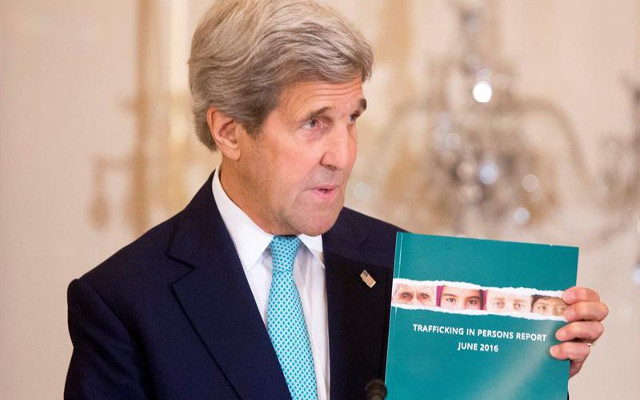Yesterday, the US Department of State released the 2016 Trafficking in Persons country narratives. Reports revealed that none of the six Gulf Cooperation Council (GCC) member states have attained a Tier 1 status indicating compliance with minimum standards in eliminating human trafficking. Americans for Democracy and Human Rights in Bahrain (ADHRB) welcomes these thorough reports detailing US concerns with the ongoing abuses in Bahrain and the GCC.
With the exception of Oman and Kuwait, the tier rankings of the GCC countries remained unchanged. The State Department downgraded Oman from Tier 2 to the Tier 2 Watch List, as Oman had been classified as Tier 2 for the prior four years. The report upgraded Kuwait from a Tier 3 country to the Tier 2 Watch List. The United Arab Emirates (UAE) and Bahrain were again classified as Tier 2 countries. Saudi Arabia and Qatar also remained on the Tier 2 Watch List. 2016 is Qatar’s third year on the Watch List, meaning it was granted a waiver to not be downgraded; the government of Qatar submitted a written action plan demonstrating intent to implement positive steps within the next year.
As the predominantly stagnant rankings suggest, most Gulf countries did not make significant progress to comply with the minimum standards for eliminating trafficking, despite their limited efforts. All six GCC member states continue to utilize an employer-based sponsorship system known as kafala, which restricts migrant workers’ autonomy and movement. Most labor laws in the GCC do not encompass domestic workers, and few countries have specific protections for them. Passport revocation, wage withholding, and contract substitution continue to be widespread abuses. The country reports critiqued the lack of governmental response to all of these issues.
The Department of State was highly critical of GCC governments’ investigation practices. The number of investigations into potential trafficking crimes remained low amongst all GCC members, as did conviction rates. The UAE, Kuwait, Bahrain, Qatar, and Oman each investigated and prosecuted less than 25 cases of human trafficking during the reporting period. The reports also raised concerns about victim identification. In each country victims of trafficking were insufficiently identified. GCC governments prosecuted many potential victims for crimes that were the direct result of them having been trafficked, including prostitution or absconding.
The country narratives highlighted areas of improvement for each country, especially Kuwait, which had its status upgraded. Kuwait and Saudi Arabia convicted more traffickers this year than last. The UAE made amendments to its labor law, while Qatar’s government began to reform the kafala system. The US Department of State rightly exercised caution regarding all of these progresses and remained skeptical of their implementation.
“We are pleased to see the State Department’s continued criticism of efforts to combat human and sex trafficking abuses in the GCC,” said ADHRB Executive Director Husain Abdulla. “The Gulf states need to take more direct action to eradicate the modern slavery that exists in their societies. We call on the US to urge the international community to raise their concerns as well,” he continued.
ADHRB looks forward to the continued efforts by the US to urge the governments of the GCC to protect the rights of migrant workers and human trafficking victims in their countries. We also call upon GCC government officials to listen to the United States’ valid critiques and implement concrete mechanisms to eradicate forced labor and human trafficking.





